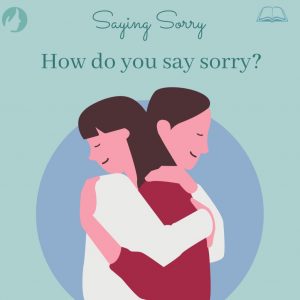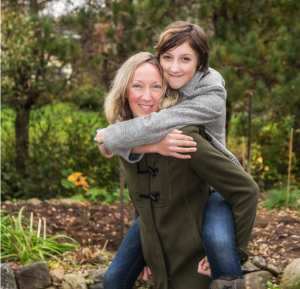
Saying sorry takes strength
When two people argue, both of them feel hurt. Both need to feel heard and both need to hear “I’m sorry.”
How can we make the relationship matter more than the argument?
Tell us, how do you feel after someone says sorry to you? There are so many different ways of saying sorry, let’s share ideas for how people show that they’re sorry.
This week our artist is going to use all your comments to inspire her to create a sorry looking piece of art!
Artwork in progress

Thank you, you’ve shared some great and wise thoughts about saying sorry. Please keep your thoughts coming, there’s so much we can learn from one another on this topic.
Our artist Tanja, when working on a design for this theme, said she, “wanted to go for something like ‘saying sorry is hard, can be embarrassing, or make you feel bad but you’ll still be loved by your friends and family’.”
What do you think of the picture she’s created for your Mother-Daughter Date diary?



13 Comments
I say sorry and explain why I might have said what I said ……. there is always a feeling behind the behaviour, even for us adults! A hug to make up always feels good too. Saying sorry needs to come from the heart, be genuine and not forced. If someone says sorry to me I say ‘I forgive you’ to validate their sorry. Forgiveness is very important too ❤️
Yes Jayne, just as saying sorry takes strength, being forgiving takes strength too.
Hmmm…. this is difficult. I think it’s very easy to say sorry, but the problem is, it needs gravitas and the person who is apologising has to mean it – not just in that moment, but also for future reference – depending on the severity of what they’re apologising for. My ex used to apologise all the time, but it was just to take the heat off himself – he never made amends or actually tried to change the way he treated me, he was a narcissist and had anger issues. So to me, apologies dont mean much anymore, particularly if they’re followed up with a “but”.
I’m not perfect. I apologise to my children at times, I might be impatient, angry or frustrated, but I can never stay like that for long, so even if my behaviour might have been justified, I do apologise sincerely, and try to explain why I lost my rag. And if its because I’m annoyed at my own shortcomings, I’ll say so. They know it, and we are never cross at each other for long. I think my relationship to my children is unusual, but in a good way. I never pretend to be the infallible adult who is always right. But it does mean I’m rubbish at times at enforcing my wishes on them, so there is a lot of compromise. Not always the best way forward with teens.
Absolutely, who and how someone says sorry makes all the difference.
We all find that a huge hug helps the situation and makes us feel better…….it’s ok to argue, and sometimes a very positive thing to express feelings….I encourage my children to air their conflicts and to explore and understand why they are feeling the way they do. And then there is always the expectation that sorry is part of that discussion…and understanding what it is we.’we saying sorry for!
It’s so important to be able to say difficult things and express feelings. And to know what we’re saying sorry for.
Amy: Saying sorry like you mean it, without being told to say it. Having love, like hugs and kisses. When someone says sorry, the anger inside me cools down. Its like larva and turns into a cool rushing river.
So brilliant to remind us how important it is that we say sorry when we feel ready to say it and mean it. And I love your image of hot larva turning into a cool rushing river when someone says sorry.
A genuine sorry can be so hard. It is so much about the tone, the eye contact and the feeling behind it. I often need to remind my kids to start again with their sorry, to pause and to decide whether they can say it with meaning. Not always easy. Sometimes easier in writing or with a gesture. The flipside is forgiveness, not to forget but to move on.
We know a genuine sorry when we get one but you’re so right, it can be hard to give one. And just as hard to forgive. Great suggestion to say sorry in writing or with a gesture.
I always say, it’s not your fault I acted that way. I was tired and stressed and worried and I’m sorry I wasn’t more patient. And when the other person accepts that and moves on, I can move on too.
So true, taking responsibility for our behaviour is a really important part of saying sorry.
From adults, I need a sorry with either an explanation or a change of behaviour (where one is possible).
Sorry becomes meaningless if it’s just a word to placate.
My son’s autism/demand avoidance makes saying sorry extremely difficult for him, so I never expect a sorry from him. When I get one, I know it’s 100% genuine. I don’t expect him to apologise for his disability and let him know that however his difficulties impact on me, it’s not his fault.
I always apologise to him if I’ve been cross or shouty or impatient or not understood him. I explain myself and let him know that I’m responsible for my actions and emotions. I hope that modelling self responsibility will be a better lesson than an empty sorry ritual.